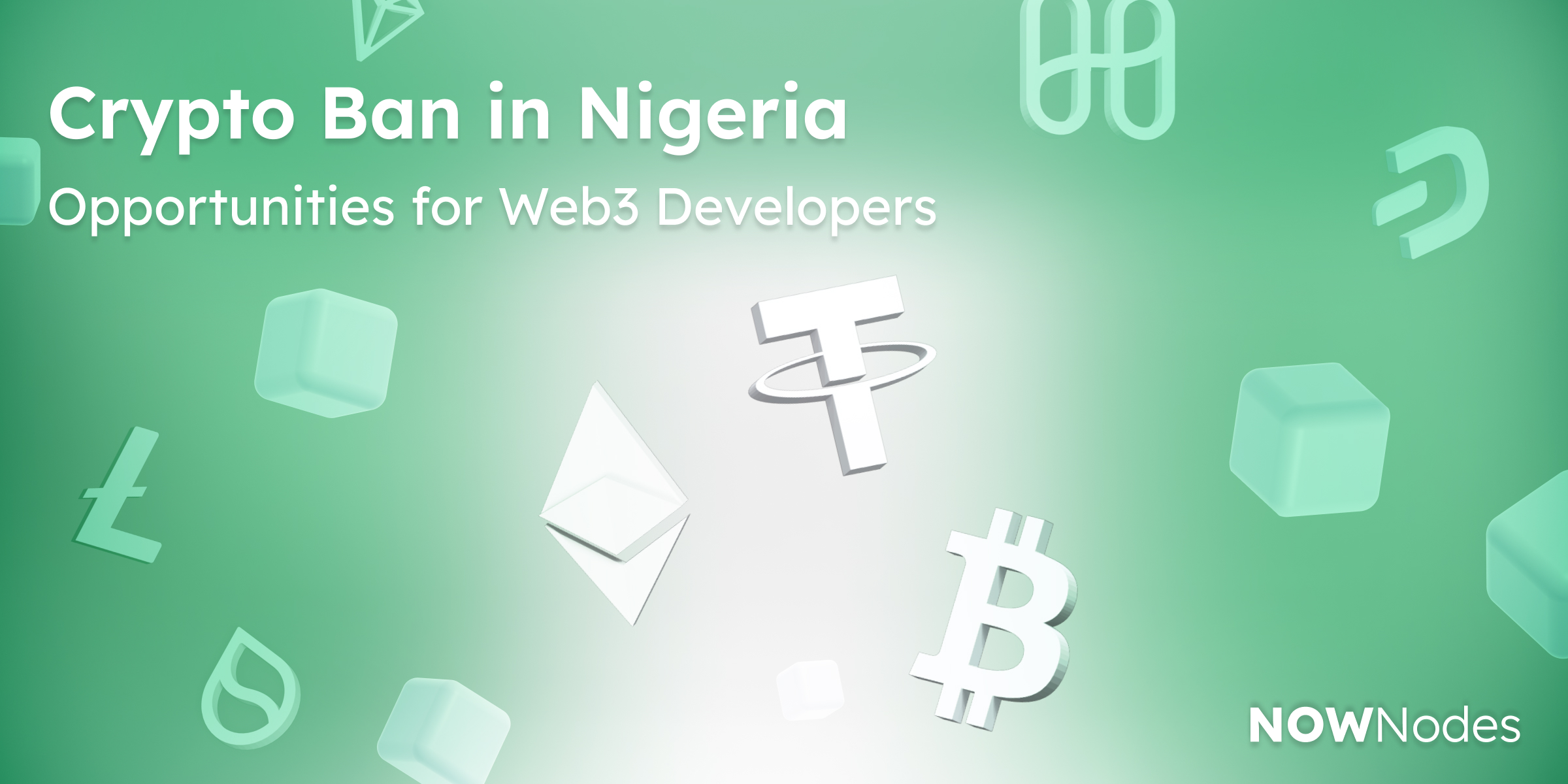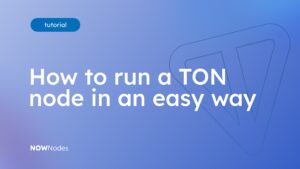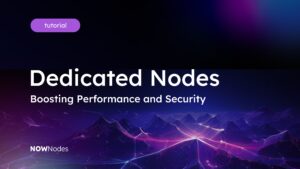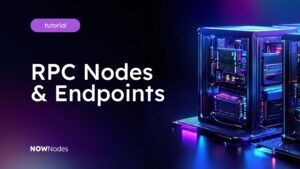The dynamic world of cryptocurrency in Nigeria has recently encountered a significant hurdle with the government’s decision to impose restrictions on access to crypto wallets and exchange platforms. This development has stirred a wave of concern among crypto enthusiasts, Web3 developers, and enterprises, as it presents a new set of challenges and uncertainties in the burgeoning field of blockchain technology and digital currencies. Understanding these changes and adapting to them is crucial for continued innovation and growth in the blockchain ecosystem in Nigeria.
However, there are a variety of pros and cons to this news. In this article, we are going to provide an overview of the current situation of the Nigerian government restrictions on cryptocurrency platforms, as well as give some recommendations for Nigerian Web3 Developers and Crypto Enterprises about how they can save their business and make it even grow larger by accessing RPC full nodes via NOWNodes API.
Nigeria Limits Access to Crypto Wallets and Exchange Platforms
The Central Bank of Nigeria (CBN) is implementing regulations to monitor digital asset service providers, the nation has instructed its telecommunications companies to restrict access to websites related to cryptocurrencies, including well-known entities such as Binance, Kraken, and Coinbase. This directive serves as a continuation of the CBN’s decision in December 2023 to reverse its earlier prohibition from February 2021 on cryptocurrency dealings, thus modifying its stance on crypto assets.
This recent action to ban access to crypto sites in Nigeria aims to mitigate the speculative trading of currencies within the country. In light of complaints from individuals facing difficulties in purchasing dollars, Binance has made it clear that its platform is not designed for determining currency values, especially in light of the newly imposed limitations.
Nigeria’s decision to limit access to cryptocurrency wallets and exchange platforms is a response to concerns over financial stability, and money laundering. Mainly, these restrictions were implemented to stop “the bleeding” of the Nigerian fiat currency Naira. While these measures aim to protect the financial system, they also pose challenges for the evolving cryptocurrency market in Nigeria, affecting developers, traders, and investors alike. The restrictions can hinder the development of decentralized applications (dApps) and the broader adoption of blockchain technology.
However, refuses news about restrictions of blocking access for users from Nigeria. For example, Cryptocurrency platform Coinbase is denying reports that it is being blocked in Nigeria.
As Coinbase CEO Brian Armstrong posted on X/Twitter:
“This is inaccurate WRT Coinbase as far as I can tell.
Coinbase products are still operating (no interruption)
We haven’t received any outreach or communication from officials in Nigeria”
What Should Nigerian Web3 Developers Do After Crypto Ban in Nigeria?
Overall, the current situation with the crypto ban in Nigeria still seems obscure, as a few months before Nigeria’s central bank lifted a ban on transacting in cryptocurrencies. It might be complicated for Web3 developers and enterprises from Nigeria to be in such constantly changing conditions. However, the most harmful this restriction could be for regular users, who lost their access to crypto wallets. Developers can still have access to different blockchain networks by using third-party node providers available worldwide such as NOWNodes in their development needs even without using VPN. Moreover, some of the Web3 developers and crypto enterprises can even benefit from this news, as with limited access to the services of the most powerful players in the market and reduced competition new possibilities for crypto wallet and exchanges businesses are opening up.
With the access restrictions to centralized exchanges, such as Binance and Kraken, there could be a new trend in Nigeria towards DeFi platforms and decentralized exchanges, which opens great possibilities for Web3 developers from Nigeria. Decentralized exchanges operate without a central authority, facilitating direct peer-to-peer transactions. DEXs can be a viable alternative for developers to trade and access cryptocurrencies without the limitations imposed on centralized platforms. Moreover, it is a great chance for Web3 developers and crypto enterprises to build brand-new DeFi and DEX platforms aimed at the Nigerian crypto market.
In light of these restrictions, Web3 developers in Nigeria need to find innovative ways to continue their work. No doubt utilizing VPN services can help developers bypass geo-restrictions by encrypting their internet connection and routing it through servers in other countries. This can provide access to banned platforms, although it’s crucial to consider the legal implications and risks involved. However, another visible solution is leveraging services like NOWNodes, which provides access to 100 blockchain RPC Full Nodes via API key from any location across the globe. This approach allows developers to interact with various blockchains without the need to run and maintain their own nodes, thus reducing the operational challenges and costs.
How to Access Blockchains RPC Full Nodes via NOWNodes
NOWNodes is a blockchain-as-a-service solution available WORLDWIDE that provides instant access to 100 RPC nodes for all your Web3 development needs. All you need to do is to get an API key and start building! The service provides a high-quality infrastructure that is quick, cost-effective, and reliable. We have Service Quality Standards available for all partners.
Your nodes are under 24/7 surveillance – their availability and relevance are constantly being monitored. That way, our clients can enjoy the scalability for any large tasks and blazing-fast API responses. Moreover, on the NOWNodes Blog, you can find a lot of articles and developer guides about how to interact with different blockchain networks and many other exciting topics!
Using NOWNodes, developers can easily access blockchain RPC full nodes and block explorers. The process involves registering for the service, obtaining an API key, and using this key to make requests. NOWNodes offers comprehensive documentation that guides users through various operations, such as querying blockchain data, retrieving wallet token balances, and many other options. This accessibility is crucial for developers looking to build or maintain dApps, perform analytics, or integrate blockchain functionalities into existing applications.
Your connection to the NOWNodes was made as clear and easy as possible. Here’s a step-by-step guide on how to get access to any of the 100 blockchains RPC full nodes available at NOWNodes:
- Visit NOWNodes (https://nownodes.io/) and sign up for a FREE or PAID account, depending on your needs.
- Notice that you can access 5 blockchains through one API key on a FREE plan. With a paid plan you can access all the available blockchains, and Websocket connections, raise a number of requests, and many other features.
- Once you’ve signed up, you’ll have to add a new API key to your dashboard page. Find the needed node ticker and achieve all the available methods on the docs page.
- When the registration process is complete it is time to make some requests! Use the provided Endpoint for the full node that you’ve chosen and your API key to make it happen.
Future Perspective for the Nigerian Crypto Market
Despite the current regulatory challenges, the future of the crypto market in Nigeria remains promising. The country’s youthful and tech-savvy population, combined with a growing interest in digital currencies and blockchain technology, sets the stage for a vibrant crypto ecosystem. As the global and local regulatory landscapes evolve, there may be opportunities for more favorable conditions that could spur innovation and growth in the sector.
The market’s resilience, coupled with the innovative spirit of the Nigerian tech community, could lead to a more mature, secure, and vibrant crypto ecosystem. However, much depends on the evolving regulatory landscape and the ability of the crypto community to adapt to these changes while fostering growth and innovation. The following trends in Nigerian economics and the crypto sector caused by the recent ban might be:
- Regulatory Environment Evolution
- The restrictions signal a tightening regulatory environment, which could lead to a more controlled and monitored crypto ecosystem in Nigeria.
- Innovation and Adaptation
- The restrictions could spur innovation within the local crypto community, leading to the development of new platforms and technologies that comply with regulatory requirements while still serving the needs of the crypto community.
- Growth of Decentralized Finance (DeFi)
- With the restrictions on centralized exchanges, there could be a shift towards decentralized finance (DeFi) platforms and decentralized exchanges (DEXs) that operate without a central authority.
- Increase in Peer-to-Peer (P2P) Trading
- P2P crypto trading platforms may see a surge in popularity as traders and investors look for alternative ways to buy and sell cryptocurrencies without going through restricted exchanges.
- Potential for Regulatory Reforms
- Engaging with the crypto community, regulators could develop policies that support the growth of the crypto market while addressing concerns related to money laundering, fraud, and financial stability.
We are trying to keep a positive view hoping for a bright future for crypto in Nigeria. It is one of few countries with its own Central Bank sector for Digital Currency (Nigeria CBDC) and even a country’s own digital currency – eNaira. We hope that as soon as the Nigerian government manages to overcome many financial issues, we’ll see some positive news.
Conclusion
The ban in Nigeria some cryptocurrency platforms in Nigeria presents both challenges and opportunities for Web3 developers and crypto enterprises. By adapting to the current environment and leveraging services like NOWNodes, the community can continue to innovate and drive the adoption of blockchain technology. The future of the Nigerian crypto market depends on the ability of stakeholders to navigate these challenges, advocate for supportive policies, and harness the potential of blockchain to address local and global needs.
If you have some questions about NOWNodes API services feel free to contact us through the support section on our website or in the comments in our Telegram Builders Community or just by hitting our DMs at X/Twitter.
Let’s make dApps available for everyone across the globe #NOW!



